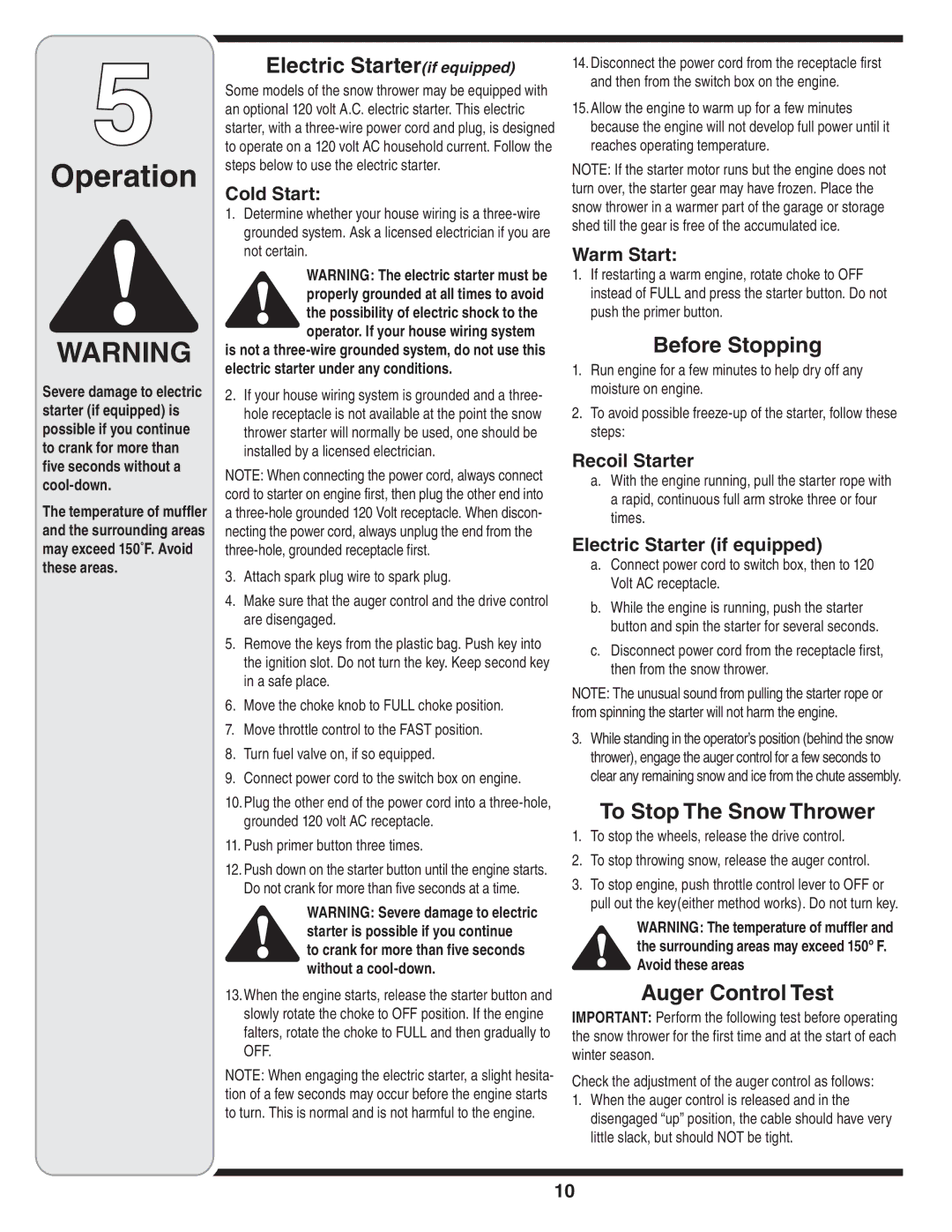
5
Operation
WARNING
Severe damage to electric starter (if equipped) is possible if you continue to crank for more than five seconds without a
The temperature of muffler and the surrounding areas may exceed 150˚F. Avoid these areas.
Electric Starter(if equipped)
Some models of the snow thrower may be equipped with an optional 120 volt A.C. electric starter. This electric starter, with a
Cold Start:
1.Determine whether your house wiring is a
WARNING: The electric starter must be properly grounded at all times to avoid the possibility of electric shock to the operator. If your house wiring system
is not a
2.If your house wiring system is grounded and a three- hole receptacle is not available at the point the snow thrower starter will normally be used, one should be installed by a licensed electrician.
NOTE: When connecting the power cord, always connect cord to starter on engine first, then plug the other end into
a
3.Attach spark plug wire to spark plug.
4.Make sure that the auger control and the drive control are disengaged.
5.Remove the keys from the plastic bag. Push key into the ignition slot. Do not turn the key. Keep second key in a safe place.
6.Move the choke knob to FULL choke position.
7.Move throttle control to the FAST position.
8.Turn fuel valve on, if so equipped.
9.Connect power cord to the switch box on engine.
10.Plug the other end of the power cord into a
11.Push primer button three times.
12.Push down on the starter button until the engine starts. Do not crank for more than five seconds at a time.
WARNING: Severe damage to electric starter is possible if you continue
to crank for more than five seconds without a cool-down.
13.When the engine starts, release the starter button and slowly rotate the choke to OFF position. If the engine falters, rotate the choke to FULL and then gradually to OFF.
NOTE: When engaging the electric starter, a slight hesita- tion of a few seconds may occur before the engine starts to turn. This is normal and is not harmful to the engine.
14.Disconnect the power cord from the receptacle first and then from the switch box on the engine.
15.Allow the engine to warm up for a few minutes because the engine will not develop full power until it reaches operating temperature.
NOTE: If the starter motor runs but the engine does not turn over, the starter gear may have frozen. Place the snow thrower in a warmer part of the garage or storage shed till the gear is free of the accumulated ice.
Warm Start:
1.If restarting a warm engine, rotate choke to OFF instead of FULL and press the starter button. Do not push the primer button.
Before Stopping
1.Run engine for a few minutes to help dry off any moisture on engine.
2.To avoid possible
Recoil Starter
a.With the engine running, pull the starter rope with a rapid, continuous full arm stroke three or four times.
Electric Starter (if equipped)
a.Connect power cord to switch box, then to 120 Volt AC receptacle.
b.While the engine is running, push the starter button and spin the starter for several seconds.
c.Disconnect power cord from the receptacle first, then from the snow thrower.
NOTE: The unusual sound from pulling the starter rope or from spinning the starter will not harm the engine.
3.While standing in the operator’s position (behind the snow thrower), engage the auger control for a few seconds to clear any remaining snow and ice from the chute assembly.
To Stop The Snow Thrower
1.To stop the wheels, release the drive control.
2.To stop throwing snow, release the auger control.
3.To stop engine, push throttle control lever to OFF or pull out the key(either method works). Do not turn key.
WARNING: The temperature of muffler and the surrounding areas may exceed 150º F. Avoid these areas
Auger Control Test
IMPORTANT: Perform the following test before operating the snow thrower for the first time and at the start of each winter season.
Check the adjustment of the auger control as follows:
1.When the auger control is released and in the disengaged “up” position, the cable should have very little slack, but should NOT be tight.
10
